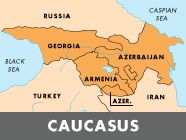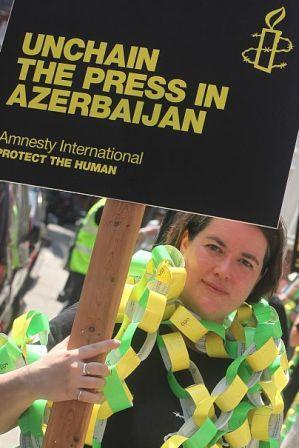 Freedom of expression organisation Article 19 welcomes the Declaration of the 7th OSCE South Caucasus Media Conference, held from 11 to 12 November in Tbilisi, Georgia.
Freedom of expression organisation Article 19 welcomes the Declaration of the 7th OSCE South Caucasus Media Conference, held from 11 to 12 November in Tbilisi, Georgia.
Article 19 supports the Declaration’s recommendations, and notes its concern regarding a number of problematic freedom of expression trends in Armenia, Azerbaijan, and Georgia.
Article 19 calls upon the authorities in these countries to redouble their efforts to promote and protect freedom of expression in accordance with their international obligations.
Article 19 shares the conference’s concerns regarding restrictions on freedom of information throughout the South Caucasus.
Lack of political will
Whilst Armenia, Azerbaijan, and Georgia have legal provisions in place protecting the right to freedom of information, in practice, government-held information is too often not made available in a manner consistent with the law. Many public bodies in these countries have failed to establish procedures to process freedom of information requests, in part due to a lack of political will to operate in a transparent and accountable manner.
In Armenia, despite the adoption of a comprehensive right to information (“RTI”) law in 2003, authorities have failed to adopt a number of regulations needed to implement the law.
In Azerbaijan, authorities have failed to appoint an Information Ombudsman as required by the 2005 RTI law. As Article 19 documented in a 2009 report, many public bodies have refused to respond to information requests on the incorrect claim that the information was a “state secret”, and some – such as the State Oil Company of Azerbaijan – have denied that they are information-owners.
In Georgia, public bodies have been criticised as being particularly slow in processing information requests, as have courts for being slow in processing RTI cases.
Violence against journalist
In addition, Article 19 notes its concern regarding other worrisome freedom of expression trends in the South Caucasus.
Violence against journalists and impunity for those who commit these acts is a serious problem in all three countries and has contributed significantly to widespread self-censorship in the region.
Few instances of violence or threats of violence against journalists have been effectively investigated and prosecuted – including the 2005 murder of Azerbaijani journalist Elmar Huseynov – resulting in a climate of fear in which few are willing to undertake the risks associated with pursuing investigative or critical journalism.
Most recently, the attack by police against an “Armenian Times” journalist, Ani Gevorgyan, while covering a political demonstration in May in Armenia, the attack by security guards against “Yeni Musavat” journalist Elmin Badalov and “Milli Yol” deputy editor Anar Gerayli while taking photographs for a story in July in Azerbaijan, and the death threats by authorities against investigative journalist Vakhtang Komakhidze in February in Georgia, remain unpunished.
State domination
State domination of the broadcast media also presents an obstacle to free expression in the South Caucasus. This is a particularly critical issue during election periods in these countries, as biased news coverage and unequal access by all candidates to broadcast media results in many voters being exposed only to the ruling parties’ views and unable to make fully informed political decisions.
For example, in Armenia, the suspension since September 2008 of issuing broadcast media licences during the digitalisation process – which may continue as late as 2015 – continues to prevent entry to new broadcasters.
In Azerbaijan, the BBC, Radio Free Europe/Radio Liberty, and Voice of America have remained off the air since the decision effective in January 2009 to ban foreign broadcasters from accessing national frequencies, removing the only critical sources of news coverage for many Azerbaijanis.
In Georgia, the Georgian National Communications Commission has been criticised as lacking independence from the executive authorities and carrying out its licensing and regulatory function in a politically biased manner.
Legal barriers
Finally, a number of other legal barriers to freedom of expression persist in the South Caucasus.
In Armenia, despite the positive step of decriminalising defamation in May, amendments made in June to the Law on Television and Radio have negative implications for broadcast pluralism.
In Azerbaijan, defamation remains criminalised, and other criminal laws are often misused to silence critical voices.
In Georgia, problems persist with implementation of  the country’s largely progressive media laws, which have been criticised as being applied in a discriminatory manner to restrict the operations of independent media outlets.
the country’s largely progressive media laws, which have been criticised as being applied in a discriminatory manner to restrict the operations of independent media outlets.
Article 19 calls upon the authorities in Armenia, Azerbaijan, and Georgia to take immediate steps to address these problems, in compliance with their international obligations to promote and protect freedom of expression.
Contacts
For more information, please contact: Rebecca Vincent, Europe Programme Manager/Coordinator at rebecca@article19.org or +44 20 7324 2500.
HRH London, based on Article 19 press release.
Related links:
Azerbaijan: free expression under attack before elections
Azerbaijan: freedom of expression situation has deteriorated over the past five years
International freedom of expression organisations call for Eynulla Fatullayev’s release
Azerbaijani bloggers sentenced
Georgia: Journalist receives death threats from authorities
Five billion people in the world have the right to information
Russia: freedom of expression remains under threat in the North Caucasus


